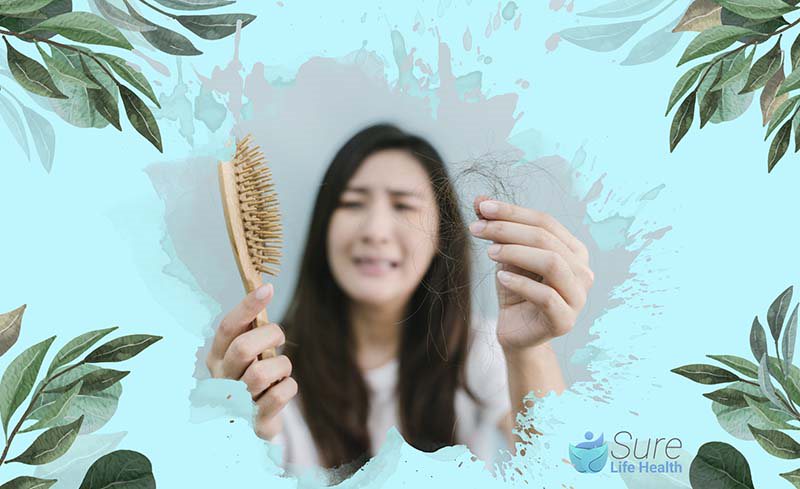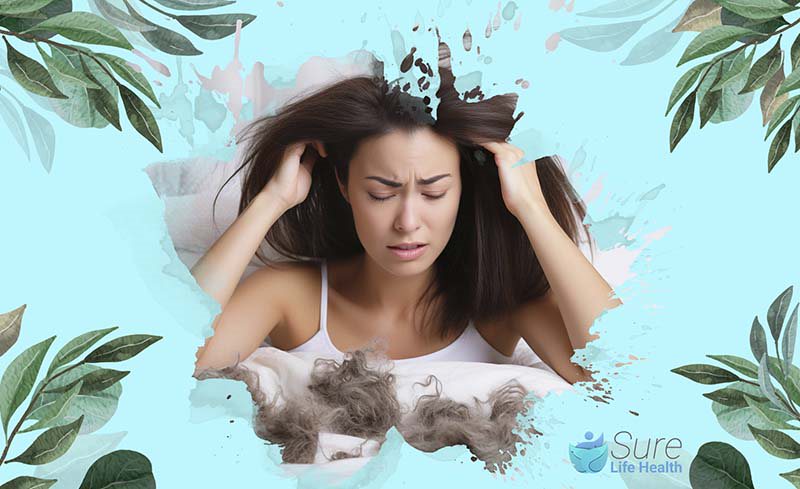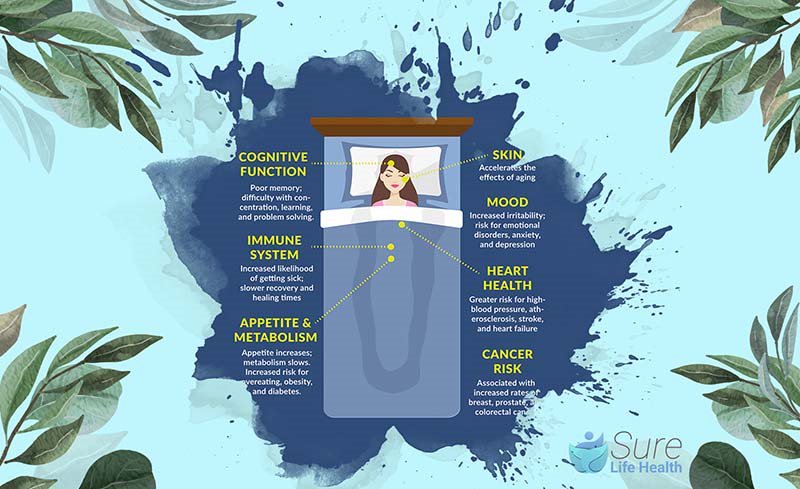The correlation between insufficient sleep and hair loss has been a topic of discussion among experts and individuals alike for quite some time. While the adverse effects of sleep deprivation on overall health are well-documented, does lack of sleep cause hair loss?
In this article, we explore the complex relationship between quality sleep and hair health. We’ll examine the potential link between lack of sleep and hair loss and share practical tips to enhance sleep quality and effectively address hair loss concerns.
Does Lack of Sleep Cause Hair Loss?
Certainly, poor sleep habits can significantly impact overall health, and hair loss may indeed be one of the consequences of inadequate sleep. A comprehensive study conducted in Korea from 2002 to 2013 investigated the association between sleep disorders and hair loss.
The findings revealed that individuals with sleep disorders faced a notably higher risk of experiencing alopecia areata compared to those without such disorders.
Consistent lack of sleep can compromise the strength of hair follicles and disrupt hormone secretion. Consequently, hair may appear fragile, dry, and lackluster. It’s important to note that while a period of insufficient sleep may not always directly lead to alopecia, it can result in a decrease in hair density over time.

The Impact of Sleep on Hair Loss
Sleep deprivation, being a form of stress, can significantly influence hair loss. During sleep, our bodies undergo crucial repair and renewal processes. However, when sleep is lacking, these vital repair mechanisms are compromised.
Stress, a common consequence of sleep deprivation, can have various adverse effects on our bodies. One such effect is the impaired functioning of the skin, which can consequently impact hair follicles. Sleep plays a pivotal role in facilitating protein synthesis for hair health. Without adequate sleep, this process is hindered.
Moreover, sleep deprivation may trigger hair loss and exacerbate genetic hair loss conditions such as androgenic alopecia. Furthermore, studies indicate that poor sleep quality can lead to a reduction in melatonin levels. Melatonin, known for its role in regulating sleep-wake cycles, also plays a crucial role in hair health. Its depletion could potentially contribute to hair thinning.
Interestingly, some research suggests that melatonin supplementation may have the potential to mitigate hair loss in certain cases and promote hair growth in others. This highlights the intricate relationship between sleep, melatonin, and hair health, warranting further exploration and consideration.

Is Hair Loss From Lack of Sleep Reversible?
Reversing hair loss due to lack of sleep is typically possible, though success depends on identifying the root causes of both issues.
When sleep deprivation contributes to hair loss, it’s often connected with factors like stress, illness, or trichotillomania. In such cases, restoring your hair’s health is feasible.
Consider a comprehensive strategy: First, identify and address the underlying causes of your hair loss. Second, incorporate effective hair-loss treatments into your regimen. Third, prioritize enhancing your sleep quality to promote overall well-being and hair recovery.

What Kinds of Effects Does Sleep Deprivation Have on the Body?
Sleep deprivation can have widespread effects on both your health and appearance. Beyond contributing to hair loss, insufficient sleep can lead to an oily scalp and greasy hair.
In terms of appearance, expect to see dark circles under your eyes, dull skin, and possibly an acne breakout. Additionally, skin conditions like eczema or psoriasis may worsen with sleep deprivation.
Moreover, sleep deficiency elevates the risk of serious health conditions. Diabetes, heart disease, and high blood pressure are among the ailments impacted by inadequate sleep. Furthermore, it can compromise your immune system, leaving you more susceptible to illnesses.

How to Prevent Hair Loss Due to Lack of Sleep
When sleep deprivation is the culprit behind your hair loss, there are effective strategies to mitigate it. While achieving an ideal amount of sleep might not always be feasible, consulting a doctor about your sleep patterns can provide valuable insights and solutions.
Lifestyle Adjustments for Enhanced Sleep Health
Implementing simple lifestyle changes can significantly curb hair loss attributed to lack of sleep. Elevating the quality of your hair and minimizing shedding can be achieved through alterations in sleeping habits, evening dietary routines, and alcohol intake moderation. Understanding the correlation between alcohol consumption and hair loss is key.
- Establish a Consistent Sleep Schedule: Aim for 7-8 hours of sleep each night to help regulate cortisol levels. Additionally, explore other methods to improve your sleep quality.
- Cultivate a Bedtime Ritual: Foster better sleep by adopting healthy eating habits and reducing screen time before bed. Eating a nutritious diet and avoiding caffeinated beverages can contribute to more restful sleep.
- Create a Serene Sleeping Environment: Keep your bedroom dark and limit the use of electronic devices before bedtime. Practicing relaxation techniques before bed can help reduce stress and promote better sleep.

How to Improve the Sleep Quality to Avoid Hair Loss?
Nowadays, most people lead very busy lives, and regardless of the cause of your sleep disorder, you might find relief by adopting some of these practices to reduce stress and improve your sleep quality.
Yoga and Breathing Exercises
Yoga and breathing exercises have been proven to be beneficial for relaxation and stress relief. Many people practice yoga to help lower their anxiety and stress levels.
Avoiding Alcohol and Cigarettes
The negative effects of tobacco and alcohol on our health and hair are well-known. It’s recommended to avoid them to improve overall well-being.
Setting a Sleep Schedule
Going to bed at the same time every night, even on weekends, can help regulate your body’s sleep patterns and improve rest.
These simple tips can help manage stress and improve sleep. However, if you have serious sleep issues, it’s best to seek professional help.
Conclusion
The connection between lack of sleep and hair loss is intricate. Prolonged sleep deprivation can disrupt the natural hair growth cycle, leading to thinning and shedding. Prioritizing high-quality sleep and managing stress effectively can promote healthy hair growth and improve overall health.
If you are experiencing hair loss due to lack of sleep and wondering, “Does lack of sleep cause hair loss?” it is advisable to seek professional advice for personalized guidance and treatment solutions.
Don’t miss the opportunity to explore further insightful content from SurelifeHealth.
Professor Gaye Cunnane, PhD, MB, FRCPI
As the Director of Health and Wellbeing at RCPI, Professor Gaye Cunnane is at the helm of initiatives aimed at enhancing the health and well-being of RCPI Trainers and Trainees. Her role extends beyond administration; she is also a respected clinical professor of rheumatology and a consultant rheumatologist at Trinity College Dublin (TCD) and St James’s Hospital. Prof. Cunnane’s medical journey began at TCD, where she graduated from medical school, and her path has been marked by both clinical and academic excellence.
After completing her basic clinical training in medicine, she embarked on PhD studies at University College Dublin and St Vincent’s University Hospital. Her research during this period was focused on prognostic markers in early inflammatory arthritis, a project that saw her collaborating with esteemed universities across Europe, including in Switzerland, The Netherlands, the UK, and Sweden.
Prof. Cunnane’s career took her to the University of California, San Francisco, where she spent three years delving into research on new treatments for lupus. Her academic prowess led her to the University of Leeds in 2001 as a senior lecturer, before returning to Ireland in 2003 to assume her current roles. She has also served as the National Specialty Director for Rheumatology training in Ireland, Programme Director for Basic Specialist Training with RCPI, and as a past President of the Irish Society for Rheumatology.
PUBLISHED ARTICLES
“Rheumatic disease differentiation using immunoglobulin G sugar printing by high-density electrophoresis”: Published in The Journal of Rheumatology, this study reflects her in-depth investigation into rheumatic diseases.
“Benefits of exercise in patients with rheumatoid arthritis: a randomized controlled trial”: This research work, highlighting the positive impact of exercise on rheumatoid arthritis, underscores Prof. Cunnane’s dedication to practical, patient-centered research.
Additionally, Prof. Cunnane has made notable contributions to the Annals of the Rheumatic Diseases, discussing early referral, diagnosis, and treatment of rheumatoid arthritis. She has also been involved in a study on the NCBI platform investigating exercise benefits in rheumatoid arthritis patients.
Professor Gaye Cunnane’s career is a testament to her commitment to improving patient outcomes in rheumatology through rigorous research, clinical excellence, and dedicated teaching. Her work continues to influence the field of rheumatology, both in Ireland and internationally.

